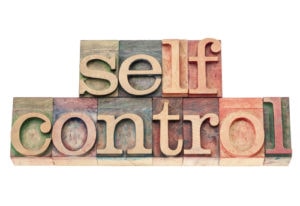By: Design for Change Recovery
Categories:
Learning Self Control
You are here:Self control is often one of the first casualties of drug addiction or alcoholism. Substance misuse or inappropriate use overwhelms a person’s metabolism and brain chemistry and creates a psychological connection to a substance that requires a massive effort to defeat. To break a cycle of substance misuse or inappropriate use, an addict or alcoholic needs to retrain his brain and metabolism to function without addictive substances. Learning self-control is a key to this process.
At its most basic level, self-control refers to an individual’s ability to employ reason and logic to make a rational decision over whether or not to do something. Drug addicts are chemically impaired in their self-control. They react to triggers by using drugs because their brain has been rewired to do so. Without making a conscious decision about that use, even when their rational thought processes tell them not to use drugs, that will be their default process. Drugs or alcohol will supplant an addict’s self control and will leave him no option apart from using drugs to cope. Addiction is not a matter of control, will, or choice. Those systems are altered in the brain, leaving an addict powerless, until he gains the tools to fight back.
Self-control is also tied to an individual’s ability to recognize his own vulnerabilities. An addict will consciously understand that alcohol and drugs are hurting him, but those same substances obscure this rational conclusion and lead him to a life of denial, living without consequence. An addict or alcoholic will argue that he has turned down the occasional opportunity to use alcohol or drugs, and that his ability to do so is evidence of his belief that he is not addicted and is still able to exercise self-control. An occasional burst of control under ideal conditions, however, is not the same as exercising self-control in the face of the triggers that facilitate an automatic response on a daily basis. An addict’s denial and defensiveness about his loss of self-control are merely symptoms of his addiction.
Self-control grows stronger as a person exercises more and more self-control over time. Minor victories lead to greater successes. The temptations to use drugs or alcohol will be ever-present, but a sense of self-control that grows stronger over time will allow an addict to meet and overcome those temptations with relative ease. Eventually, self-control becomes more habitual than drug addiction.
You can and you will be victorious over addiction. There is a hope and a freedom waiting for you in recovery. Design For Change offers men’s and women’s treatment programs as a refuge for those in addiction, seeking change. Our programs incorporate 12 step philosophy to help clients change their lives, one step at a time. For information, call us today: (877) 267-3646



